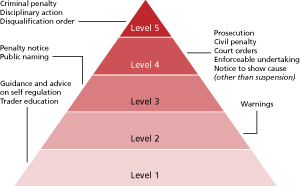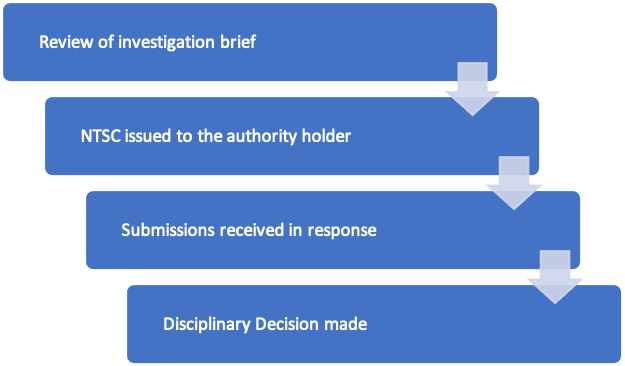Fair Trading's role in compliance
NSW Fair Trading promotes a fair marketplace for consumers and traders by maximising traders' compliance with regulatory requirements.
We safeguard consumer rights and investigate alleged breaches of the legislation we administer.
In doing so, Fair Trading also seeks to educate and engage with both consumers and traders on issues that affect their rights and obligations.
As a regulator, the main concern is to minimise any direct financial or material harm or detriment to a consumer from a business that fails to comply with the law.
Our compliance efforts include a commitment to working with businesses and educating industry groups and other Government agencies to promote voluntary compliance. Proactive inspection programs are an effective way of achieving this important goal.
Prevention is better than cure. We make comprehensive use of educational campaigns to inform consumers and businesses of their rights and obligations under the law.
We seek to ensure it's as easy as possible for consumers and traders to understand and comply with their rights and obligations.
We consider that consumers are best served by a competitive marketplace in which businesses compete fairly, in compliance with the law.
We strive to ensure customers are informed and not susceptible to misrepresentation.
We also consider most businesses want to treat their customers fairly and comply with the law.
With our help we hope to make it easier to stay in business for traders in NSW.
Compliance and enforcement remedies
Fair Trading has a range of compliance and enforcement options available to achieve compliance with the law and enhance consumer protection.
Fair Trading allocates resources where we can best address non-compliant conduct with the greatest benefit to individuals and the community.
While all complaints are considered, we exercise a risk based approach when determining allocation of resources and the action to be taken.
There are some forms of conduct that are so serious and detrimental to consumers (such as significant trust account fraud) that Fair Trading addresses them as a priority.
Fair Trading will also prioritise the assessment of product safety issues which have the potential to cause harm, or even death.
Where possible we aim to give the business or trader concerned a reasonable opportunity to respond, and provide a general summary of the actions we propose to take.
However, in some instances it may be in the public interest to act promptly, without giving the trader or business prior warning.
A major reason why we undertake targeted compliance and enforcement action is to achieve outcomes that deter other businesses from engaging in similar unacceptable behaviour.
Publicising the outcomes of our compliance and enforcement actions has a positive deterrent effect.
Our approach to compliance and enforcement remedies is summarised in the compliance pyramid below.

Disciplinary actions
The Disciplinary Action Unit (DAU) undertakes disciplinary proceedings against current and former licence holders, and directors under a range of legislation administered by NSW Fair Trading.
The DAU is part of the Investigations and Enforcement Branch, Better Regulation Division. The DAU receives matters from various investigation branches but forms its own opinion on whether there is sufficient evidence to proceed to disciplinary action.
Depending on what legislation the licence holder operates under, there are a range of disciplinary actions that can be imposed by the DAU.
The most serious breaches can result in a licence holder or former licence holder being permanently disqualified from holding a licence, certificate or authority.
Disciplinary action may involve one or more of the following.
- a formal caution or reprimand
- one or more conditions on the licence, certificate or authority;
- a monetary penalty, up to a specified amount
- suspending the authority for a period of time
- immediately cancelling or revoking the authority
- disqualifying a licence holder from holding and/or obtaining an authority in the future.
Disciplinary proceedings
Conduct that involves serious customer detriment or risk to public safety are prioritised by the DAU.
The DAU examines all evidence obtained during the investigation to determine if there are any grounds for taking disciplinary action under the relevant legislation.
Grounds commonly used are the:
- holder is not a fit and proper person to hold the licence
- person has contravened, or the Secretary has reasonable grounds to believe that person is likely to contravene, a provision of the Act or the regulations;
- person has contravened a condition of the licence
- person has, in the course of carrying on business or exercising functions under the licence, acted unlawfully, improperly, unfairly or incompetently.
If there are grounds for disciplinary action, the process is as follows.

Notice to Show Cause (NTSC)
If the DAU is satisfied there are one or more grounds for taking disciplinary action, and there is evidence supporting each ground, a Notice to Show Cause (NTSC) will be issued to the licence holder or former licence holder.
In certain circumstances a NTSC may also be issued to a director or nominated supervisor of a company who holds or held a licence.
A NTSC will set out the grounds and supporting evidence relied upon and provide an opportunity for the licence holder or former licence holder to respond to the allegations put forward by NSW Fair Trading.
A licence holder or former licence holder may obtain legal advice or representation, and make submissions (either orally or in writing) to:
- explain why disciplinary action should not be taken against them
- make an admission of guilt
- propose an appropriate penalty that should be taken
- outline any mitigating factors that should be considered.
In some circumstances, it may be in the public's best interest to take immediate disciplinary action without issuing a NTSC to the licence holder or a licence holder may be suspended on issuing the NTSC.
Disciplinary decisions
The Guidelines for determining a disciplinary action outcome (Guidelines) outline the 5-step process that is considered by the DAU to determine a disciplinary action outcome (also known as a disciplinary decision). The Guidelines are considered in conjunction with Schedule 1 - Guidance for all DAU Administrated Legislation.
The DAU must consider any submissions made and examine any new evidence brought to light before making an informed decision if disciplinary action should be taken against the licence holder or former licence holder.
The circumstances of the individual or company will also be taken into consideration.
A decision will be made by a delegated decision maker, who acts on behalf of the Commissioner for NSW Fair Trading.
If disciplinary action is taken, a series of documents will be sent to the licence holder or former licence holder which clearly set out:
- the grounds for taking disciplinary action
- detailed reasons and evidence for each ground
- any mitigating and aggravating factors
- the disciplinary action taken
- avenues for appeal.
The outcome of the decision can be published on the NSW Fair Trading website (as public data and statistics) and the NSW Public Register will be updated with the disciplinary decision.
Avenues for appeal
If the licence holder or former licence holder isn't satisfied with the disciplinary decision made by the delegated decision maker, they may request an internal review.
Internal reviews are conducted by the Reviewable Decisions Team within Better Regulation, who determine whether to affirm, vary or revoke the disciplinary decision.
If the licence holder or former licence holder is not satisfied with the internal review, they may submit an application for administrative review to the NSW Civil and Administrative Tribunal (NCAT).
Our compliance priorities
The national Compliance and Dispute Resolution Advisory Committee (CDRAC) ensures that compliance and dispute resolution across Australia is coordinated, efficient, responsive, and where appropriate, consistently applied.
CDRAC is currently Chaired by the Commissioner for NSW Fair Trading. NSW plays a significant leadership role in the coordination of dispute resolution, compliance and enforcement matters at a national level.
Prosecution guidelines
The Fair Trading Prosecution Guidelines (PDF, 88kb) outline the prosecution process for breaches of the legislation administered by Fair Trading.